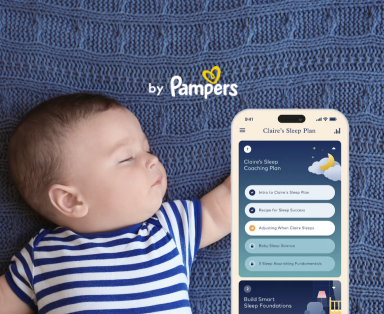Sleep Training: When and How to Start for Your Baby
IN THIS ARTICLE
Wondering what sleep training is, or how to sleep train your baby without stress? You're not alone. Sleep training simply means helping your baby learn to fall asleep independently—without rocking, feeding, or being held. There’s no one-size-fits-all method, and it’s normal to have questions like:
When can you sleep train a baby? Most experts suggest starting around 4 months, once your little one can self-soothe and has more predictable sleep patterns.
How long does sleep training take? Many families notice changes within a few nights to a couple of weeks, depending on the method and consistency.
Is sleep training harmful? No, when done thoughtfully, research shows that sleep training methods are safe and support healthy development.
What’s the best way to sleep train? From gentle sleep training to more structured approaches like the Ferber Method, it all depends on your child's temperament and what feels right for your family.
We’ll walk you through different sleep training techniques, how to spot sleep disruptors, and tips to make the process easier. Whether you’re just exploring or ready to build a sleep training schedule, this guide can help you feel more confident and supported.
What Is Sleep Training?
Sleep training is the process of helping your baby learn how to soothe themselves, allowing them to fall asleep independently at bedtime and during routine nap times. It also helps your little one learn to settle back to sleep on their own when they wake during the night, provided they don't require attention for hunger, discomfort, or diaper changes.
An essential part of understanding what sleep training is involves becoming familiar with your little one's natural sleep rhythms and creating a consistent bedtime routine. This routine signals to your baby that it's time for sleep, encouraging healthy sleep habits and self-soothing skills.
Is Sleep Training Harmful?
As a parent considering sleep training, you might wonder if sleep training is harmful, or perhaps you've heard arguments suggesting why sleep training is bad. However, a 2016 study by the American Academy of Sleep Medicine found that sleep-trained children tended to be more secure and predictable, as well as less irritable, less fussy, and cried less.
Sleep training focuses on helping your little one learn how to fall asleep independently, promoting their emotional and mental well-being by developing healthy sleep skills. If you have specific concerns or uncertainties, it's always helpful to speak with your baby's healthcare provider for personalized guidance.
If you're still unsure about sleep training or seeking personalized tips, consider taking this Better Sleep Quiz. The Smart Sleep Coach app provides tailored guidance to support you and your baby through the sleep training journey.
How Long Should Sleep Training Take?
It's common to wonder, “How long does sleep training take?” Sleep training may take a few days to a few weeks or more, though this may vary depending on your baby's temperament, the consistency of your approach, and the sleep training method you choose. Some may take a bit longer to adapt to new routines. If you're feeling uncertain about how long sleep training should take, remember that patience and consistency are key. If sleep training takes longer than expected or you have concerns, your baby's healthcare provider can offer guidance tailored to your situation.
When to Start Sleep Training
Deciding how and when to start sleep training your little one is a personal choice, but experts recommend waiting until your baby is at least 4 months old.
Around this age, your baby typically begins:
Recognizing patterns and anticipating sleep
Understanding the difference between day and night as their circadian rhythm develops
Sleeping for longer stretches between feedings
Instinctively calming themselves as bedtime approaches.
It's also helpful to know that around this period, your little one may experience what's known as the 4-month sleep regression, a temporary disruption in their sleep patterns. Because of these changes, many parents find this time an ideal moment to introduce consistent sleep habits.
As always, if you have questions about when you can start sleep training, check in with your child's healthcare provider for personalized advice.
Sleep Training Methods
There are several different sleep training methods you might consider. When choosing the right approach for your family, think about whether you're comfortable letting your baby cry—and if so, how long you're willing to allow it. Here are some common baby sleep training methods to help you get started.
Sleep Association
This is a gentle sleep training method. With this one, your little one will start to associate their crib with the good feelings of falling asleep.
Place your baby into the crib when they're sleepy but still awake.
If your child cries, gently reassure them at intervals of five to 10 minutes with quiet words or a soothing touch—but avoid picking them up.
Cry It Out
This sleep training technique involves:
Placing your baby in the crib when sleepy but still awake.
Allowing your baby to soothe themselves to sleep without intervention—even if they cry.
While some parents find the cry-it-out method effective, others may not feel comfortable with it. Always choose a method that aligns best with your family's comfort level.
Ferber Method
Developed in the mid-1980s by pediatrician Dr. Richard Ferber, the Ferber Method—also called the Timer Method or Interval Method—is one of the most commonly practiced sleep training techniques. It’s considered a moderate parental involvement approach.
You let your little one fuss or cry for a predetermined period before briefly going in to reassure them, without picking them up.
After reassurance, you leave the room again, gradually increasing intervals of time between each brief visit.
The intervals typically lengthen over successive nights or weeks, teaching your baby to self-soothe during the longer periods without your presence.
Many parents find the Ferber Method effective. However, some parents notice their baby’s crying might escalate during reassurance visits, prompting them to switch to a different approach with less parental involvement—it truly depends on your baby’s temperament.
Tips for Sleep Training Your Baby
When exploring how to sleep train your baby, keep in mind that sleep training is usually most effective with:
Consistency. Babies thrive on routine, which provides a sense of security because they learn what to expect next. Being consistent helps your baby understand and adopt new sleep habits more quickly.
Sleep fundamentals. A calming bedtime routine, an appropriate sleep training schedule, and a sleep-friendly environment are essential. Setting up these sleep fundamentals may significantly improve the effectiveness of any method you choose.
Give your baby a little time to settle down. Give your baby several nights (or even a few weeks, depending on the method) to grasp the concept of independently falling asleep.
Choosing the right method. The sleep training method you pick should align well with your baby's temperament and your comfort level, ensuring you can confidently and consistently apply the chosen technique.
Flexible bedtimes and sleepy cues. Your little one’s body follows a natural biological rhythm, signaling ideal sleep times. Watch for your baby’s sleepy cues and keep bedtime flexible depending on how daytime naps have gone.
Share a room in the early months of life. In the first few months, it’s safest to keep your baby in the same room as you, but in their bassinet or crib. This helps reduce the risk of SIDS (sudden infant death syndrome). The sleep clothing they wear should keep them warm but not too hot.
Patience. Learning how to sleep train effectively involves patience and understanding. Improving sleep won't happen overnight, but with consistency and gentle persistence, you'll get there. Keep in mind that your baby's sleep needs change as they grow, and you may revisit sleep training several times.
Sleep Training and naps. Nap time may also play a role in sleep training your baby because your baby’s daytime naps could have an impact on the quality of their nighttime sleep. It’s a good idea to create a routine around naps as well.
Overnight comfort. To help minimize nighttime disruptions, consider using a trusted overnight diaper like Pampers Swaddlers Overnights, designed to offer up to 12 hours of leak protection so your baby stays dry and comfortable all night long.
Things That Can Cause Sleep Habit Problems
Creating the “perfect” sleep training schedule or maintaining ideal sleep habits isn’t always easy—and that’s okay. But a few common habits may unintentionally interfere with the progress you’ve made.
Keeping these in mind may help you stay on track:
Don’t let your baby fall asleep while you’re rocking or holding them. Put your baby in their bed before they fall asleep; otherwise, they will likely become dependent upon being held or rocked to fall asleep.
Try not to let your baby fall asleep in your bed. This increases the risk of suffocation and SIDS. Plus, it inhibits your baby’s ability to learn to self-soothe and fall asleep on their own in their own bed.
Don’t let your baby fall asleep while feeding. Dropping off to sleep with a bottle of breast milk or formula in their mouth may cause tooth decay that can affect baby teeth as well as permanent teeth. It also increases the risk of ear infections. Allowing your baby to fall asleep while feeding can also lead to dependency upon this practice—they may not be able to soothe themselves to sleep otherwise.
FAQS AT A GLANCE
It’s never too early to start creating good sleep habits for your little one. Then, when your baby is 4 months old, they’ll have developed clearer sleep patterns and the ability to soothe themselves back to sleep. This is when it’s a good time to start sleep training.
The Bottom Line
Sleep training can feel overwhelming at first, but with consistency, patience, and the right method for your family, it can help your baby learn healthy, independent sleep habits.
Whether you try gentle sleep training or more structured sleep training methods, the key is finding what works for your baby and sticking with it.
Remember, every baby is different—and sleep training doesn’t have to be one-size-fits-all. If you're ever unsure, your little one’s healthcare provider can help guide you through the process.
Looking for extra support along the way? The Pampers Rewards App offers discounts and digital offers that can make your parenting journey a little easier—and a lot more rewarding.
How We Wrote This Article The information in this article is based on expert advice found in trusted medical and government sources, such as the American Academy of Pediatrics and the American College of Obstetricians and Gynecologists. You can find a full list of sources used for this article below. The content on this page should not replace professional medical advice. Always consult medical professionals for full diagnosis and treatment.





